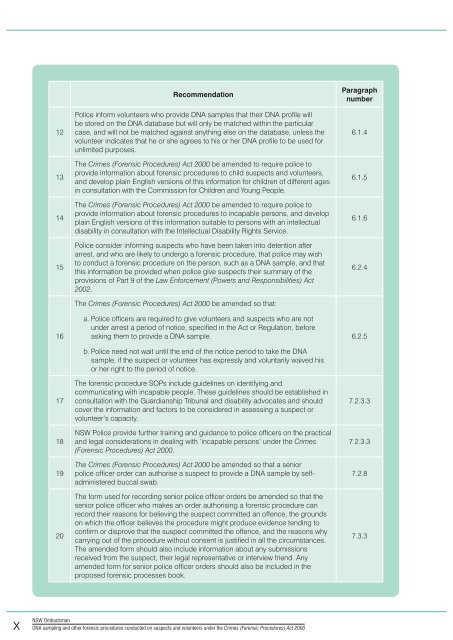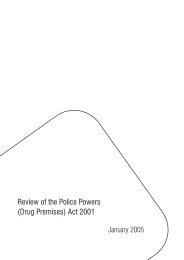Crimes (Forensic Procedures) Act 2000 - NSW Ombudsman - NSW ...
Crimes (Forensic Procedures) Act 2000 - NSW Ombudsman - NSW ...
Crimes (Forensic Procedures) Act 2000 - NSW Ombudsman - NSW ...
You also want an ePaper? Increase the reach of your titles
YUMPU automatically turns print PDFs into web optimized ePapers that Google loves.
12<br />
13<br />
14<br />
15<br />
16<br />
17<br />
18<br />
19<br />
20<br />
Recommendation<br />
Police inform volunteers who provide DNA samples that their DNA profile will<br />
be stored on the DNA database but will only be matched within the particular<br />
case, and will not be matched against anything else on the database, unless the<br />
volunteer indicates that he or she agrees to his or her DNA profile to be used for<br />
unlimited purposes.<br />
The <strong>Crimes</strong> (<strong>Forensic</strong> <strong>Procedures</strong>) <strong>Act</strong> <strong>2000</strong> be amended to require police to<br />
provide information about forensic procedures to child suspects and volunteers,<br />
and develop plain English versions of this information for children of different ages<br />
in consultation with the Commission for Children and Young People.<br />
The <strong>Crimes</strong> (<strong>Forensic</strong> <strong>Procedures</strong>) <strong>Act</strong> <strong>2000</strong> be amended to require police to<br />
provide information about forensic procedures to incapable persons, and develop<br />
plain English versions of this information suitable to persons with an intellectual<br />
disability in consultation with the Intellectual Disability Rights Service.<br />
Police consider informing suspects who have been taken into detention after<br />
arrest, and who are likely to undergo a forensic procedure, that police may wish<br />
to conduct a forensic procedure on the person, such as a DNA sample, and that<br />
this information be provided when police give suspects their summary of the<br />
provisions of Part 9 of the Law Enforcement (Powers and Responsibilities) <strong>Act</strong><br />
2002.<br />
The <strong>Crimes</strong> (<strong>Forensic</strong> <strong>Procedures</strong>) <strong>Act</strong> <strong>2000</strong> be amended so that:<br />
a. Police officers are required to give volunteers and suspects who are not<br />
under arrest a period of notice, specified in the <strong>Act</strong> or Regulation, before<br />
asking them to provide a DNA sample.<br />
b. Police need not wait until the end of the notice period to take the DNA<br />
sample, if the suspect or volunteer has expressly and voluntarily waived his<br />
or her right to the period of notice.<br />
The forensic procedure SOPs include guidelines on identifying and<br />
communicating with incapable people. These guidelines should be established in<br />
consultation with the Guardianship Tribunal and disability advocates and should<br />
cover the information and factors to be considered in assessing a suspect or<br />
volunteer’s capacity.<br />
<strong>NSW</strong> Police provide further training and guidance to police officers on the practical<br />
and legal considerations in dealing with ‘incapable persons’ under the <strong>Crimes</strong><br />
(<strong>Forensic</strong> <strong>Procedures</strong>) <strong>Act</strong> <strong>2000</strong>.<br />
The <strong>Crimes</strong> (<strong>Forensic</strong> <strong>Procedures</strong>) <strong>Act</strong> <strong>2000</strong> be amended so that a senior<br />
police officer order can authorise a suspect to provide a DNA sample by selfadministered<br />
buccal swab.<br />
The form used for recording senior police officer orders be amended so that the<br />
senior police officer who makes an order authorising a forensic procedure can<br />
record their reasons for believing the suspect committed an offence, the grounds<br />
on which the officer believes the procedure might produce evidence tending to<br />
confirm or disprove that the suspect committed the offence, and the reasons why<br />
carrying out of the procedure without consent is justified in all the circumstances.<br />
The amended form should also include information about any submissions<br />
received from the suspect, their legal representative or interview friend. Any<br />
amended form for senior police officer orders should also be included in the<br />
proposed forensic processes book.<br />
Paragraph<br />
number<br />
6.1.4<br />
6.1.5<br />
6.1.6<br />
6.2.4<br />
6.2.5<br />
7.2.3.3<br />
7.2.3.3<br />
7.2.8<br />
7.3.3<br />
x<br />
<strong>NSW</strong> <strong>Ombudsman</strong><br />
DNA sampling and other forensic procedures conducted on suspects and volunteers under the <strong>Crimes</strong> (<strong>Forensic</strong> <strong>Procedures</strong>) <strong>Act</strong> <strong>2000</strong>

















